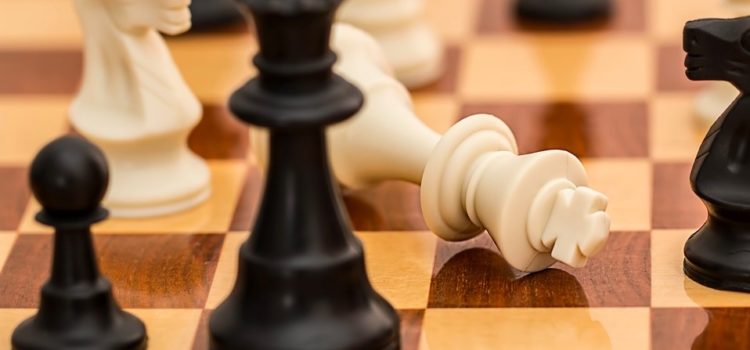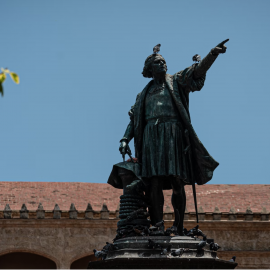

This article is an excerpt from the Shortform book guide to "On War" by Carl von Clausewitz. Shortform has the world's best summaries and analyses of books you should be reading.
Like this article? Sign up for a free trial here .
Is Clausewitz still relevant in the 21st century? What is Carl von Clausewitz’s strategy of war?
Carl von Clausewitz was a Prussian general who fought in the Napoleonic wars in the early 1800s, and he wrote extensively about military philosophy, strategy, and tactics. In his book On War, Clausewitz explains the principles that underpin his philosophy of war and discusses the rationale behind his military tactics and strategies.
In this article, we’ll describe the chronology of a hypothetical war and examine Carl von Clausewitz’s strategy as it would apply to that situation.
Initial Preparations and Organization
Imagine that it is the early 1800s. You are in command of the army of Country A, and Clausewitz is your advisor. Neighboring Country B recently broke off political negotiations on an issue of vital importance to your country, and war has been declared.
Your mission is to defeat B’s army and occupy their capital. As Clausewitz explains, every nation’s strength revolves around something—usually either their government or their military. So, by defeating their army and taking over the seat of their government, you’ll most likely render Country B powerless to refuse the political terms that would secure your nation’s interests.
(Shortform note: A similar principle is commonly used in “hardball” business strategies for dealing with competitors. Just as a nation’s strength typically comes from a few key sources, every company has certain products or services that net them most of their profits. Identifying your competitors’ most profitable products allows you to compete more effectively, whether by taking a share of a particularly profitable market or tacitly agreeing to stay out of their market as long as they stay out of yours.)
Organization of Your Army
Your army consists of infantry armed with muskets, cavalry armed with sabers, and muzzleloading cannons for artillery. On Clausewitz’s advice, you organize your troops into eight groups, with units of infantry, cavalry, and artillery in each group. This gives you maximum flexibility by giving each group all the capabilities it needs to fight independently from the other groups if needed.
(Shortform note: Carl von Clausewitz’s strategy assumes a centralized command structure and advises fully equipping each group to give the commander maximum flexibility. But some modern-day military commanders, such as US Navy Captain David Marquet, advocate not only giving troops more capability to carry out orders but empowering them with the authority to respond to situations as needed without waiting for orders.)
This strategy also keeps the hierarchy of command as flat as possible. The fewer people who have to pass on your orders before they get to the individual soldiers, the less chance of them being distorted or misunderstood. But according to Clausewitz, eight to 10 subordinate commanders reporting to you directly is about the most that you can realistically keep track of.
(Shortform note: Modern business writers echo Clausewitz’s admonition to keep organizational structures relatively flat for better communication between all levels of the organization. Interestingly, management experts like Andrew Grove (former CEO of Intel), also agree that eight direct reports is about the most that you can really manage, despite the vastly different circumstances of managing a technology company in the 21st century versus commanding an army in the 19th century.)
Mobilization and Supply
As you move your army toward B’s border, you spend about half of each day marching and the other half dealing with supply issues. You purchase most of the food and other common supplies for your army from the local people as you move through your country or collect it from local government officials who’ve purchased it for you. You lodge your troops in whatever dwellings happen to be nearest to your route. As Clausewitz explains, these practices save considerable time and effort relative to sourcing all your supplies through military supply lines and setting up campsites all along the route of your march. Besides, in your own country, the local people should consider it part of their civic duty to feed and house soldiers passing through.
(Shortform note: While housing troops in civilian homes along their route may have been convenient for the military, even in Clausewitz’s day, some people viewed it as an invasion of privacy and a burden on the civilian population. This sentiment is reflected in law: The English parliament prohibited housing troops in civilian homes without the voluntary consent of the homeowner in the 1680s. And the Third Amendment of the US Constitution similarly restricts quartering soldiers in civilian homes.)
Sourcing Food in Enemy Territory
Once you cross the border into Country B, you need to adjust your routine. You still get most of your supplies from the locals, but now you do so by sending soldiers to the local officials and demanding that they give you what you need. Clausewitz notes that this is not only the most efficient way of sourcing food and common supplies, but it also has the added benefit of weakening your enemy since you’re now feeding your troops on B’s resources instead of your own.
That said, Clausewitz also stresses that it’s important to move quickly through enemy territory because your army will exhaust all the local food supplies if you stay in one place too long. And if you run out of local supplies, bringing them all the way from your home base in wagons is risky and expensive.
To allow for unforeseen delays or emergencies, he recommends having every soldier carry four days’ rations in his own pack and keeping another four days worth of food for the whole army in supply wagons that move with the army. That way, if the need arises, you can travel or fight for up to eight days without any new supplies.
Lodging in Enemy Territory
Clausewitz says that if you’re confident that Country B’s army is too far away to threaten you with a sudden attack, you can still quarter your troops in local housing on foreign soil. This is an efficient way of living off the enemy’s resources.
(Shortform note: In business, an analogous tactic is making use of your competitors’ services to get people to use your product—initially in addition to your competitor’s product, and eventually instead of it. For example, as a startup, Airbnb made use of Craigslist (a competitor in peer-to-peer property listings) both to identify prospective hosts and to cross-advertise listings.)
However, as the likelihood of encountering B’s armed forces increases, he says you should transition to making camp each night. In camp, the army remains together instead of spreading out to shelter in different houses. This provides better security, since your night watchmen don’t have to patrol as large an area, and your soldiers can assemble for battle more quickly.
That said, even when you’re planning on making camp, Clausewitz advises against bringing tents for the soldiers to sleep in. This is because it takes many horses to carry enough tents for an army, and those horses could serve you better in the cavalry than in the supply train. He assures you that bivouacking (camping in the open air) won’t degrade your troops’ health or fighting ability.
Winning a Battle
Let’s say the first resistance you encounter is a chain of outposts guarding a river that you must cross on your way to B’s capital. As Clausewitz points out, the river limits how fast you can move your troops into position to attack the enemy forces because it takes time to build a bridge or ferry your troops across the river. This gives B’s defending forces an advantage.
However, he also says that, in this case, it’s not a major problem because your army significantly outnumbers the enemy force. Strength in numbers is more consequential than the advantage or disadvantage that terrain features like this afford. In particular, Clausewitz assures you that outnumbering your enemy by at least two-to-one practically guarantees victory in most cases.
Moreover, this situation actually amplifies your numerical advantage, because the defending force is strung out over a long stretch of river. They don’t know where you’ll try to cross the river, so they have to guard its whole length. But you can bring your whole force across at one place. This way, you’re using your whole force against a small portion of theirs.
Using Reserve Troops to Reenergize Your Forces
Let’s say you ferry enough infantry across the river in boats to hold a position on the far bank while your army builds a makeshift bridge. The bridge allows you to bring the bulk of your force across the bridge before B’s whole defending force can converge on your location.
But, on Clausewitz’s advice, you don’t send all your troops into battle at once. Instead, you send just a few more than the enemy appears to be fielding and keep the rest far enough back to be out of the battle. Clausewitz calls the troops that you don’t initially send into battle your “reserve force,” and it can serve a number of functions. For one thing, there’s always some uncertainty about how a battle will unfold, so it’s good to have troops ready that you can send in to counter the enemy’s unforeseen moves.
Moreover, you can use them to reinforce and refocus your troops in combat: Clausewitz observes that battles often open with focused, coordinated fighting but quickly devolve into disorganized, reactive fighting because soldiers easily forget their plans and orders under the stress of combat. If you send in fresh troops after the fighting has become disorganized, they can help all your forces refocus on their battle objectives. If the enemy forces have become disorganized by this point as well (and don’t similarly refocus their forces with fresh troops), this gives you a huge advantage and usually results in a decisive victory.
(Shortform note: Sun Tzu also suggests holding back a few of your troops to counter your enemy’s unforeseen moves or exploit enemy weaknesses that become apparent later in the battle. And he discusses the importance of psychological factors in battle. But he doesn’t combine the two as Clausewitz does when he recommends sending in reserve troops to refocus your attack.)
Finally, when you win a battle, you can use your fresh troops to pursue the enemy.
Making the Most of Victory by Pursuing the Enemy
As soon as the enemy begins to retreat from the battlefield, Clausewitz urges you to pursue them. Take possession of any cannons or supply wagons that they abandon in their haste to get away, take any stragglers prisoner, and keep the retreating army under fire so they never have a chance to rest and regroup.
Ideally, he says your army should follow B’s retreating force until they try to make camp for the night and then attack their camp, forcing them to retreat again. Then, your army can make camp and get a good night’s rest while B’s army marches through the night, unable to see if you’re still on their heels. If you can catch up with them and attack their camp again the next day, then they’ll have to march through the night again, and so on.
(Shortform note: Modern science supports the effectiveness of weaponizing sleep deprivation as Clausewitz advises. As Bill Bryson notes in The Body: A Guide for Occupants, studies have shown that sleep deprivation can be fatal. Lab rats that are prevented from sleeping die within a month, and in humans, genetic disorders that make sleep impossible also lead to death. Thus, in principle, Clausewitz’s tactic of preventing the enemy from sleeping by attacking their camp each night could directly inflict massive casualties if you kept it up long enough.)
The Turning Point of a War
You continue to chase the remnant of B’s retreating army until they reach a garrisoned fortress and take refuge there. On Clausewitz’s advice, you split your forces, leaving some troops to keep the fortress under siege, while the larger portion of your force continues toward B’s capital.
Splitting your forces is generally not a good idea, because it reduces your strength in numbers. But in this case, it’s warranted because the siege will take time, and the longer it takes you to reach B’s capital, the more time they’ll have to raise additional troops and prepare their defenses: Time is on their side.
Clausewitz explains that invasions such as this often reach a turning point because time is on the side of the defender, while both time and distance are working against the attacker. The longer your army is out in the field, the more your force will get worn down: You lose men in battle, even when you win the battle. You also lose men while marching, as some of them won’t be able to keep up due to illness, injury, or fatigue. Finally, you lose wagons or artillery when they break down in the field or are damaged in battle. And the farther you go into enemy territory, the more troops you have to divert to protect couriers and convoys on the routes that you use to communicate with your home country.
So the longer you continue your attack, the weaker you become while your enemy becomes stronger. As Clausewitz points out, this doesn’t matter if you completely defeat your enemy while you’re strong enough to do so, which is what you’re trying to do in this case.
But if you wait too long, or if you weren’t strong enough to begin with, then you’ll reach a point where the enemy can match your military strength. Ideally, just before you reach that point, you would break off your attack and switch to building up your defenses in the territory you’ve conquered. Then, time begins to work in your favor. But Clausewitz opines that it’s almost impossible to know exactly when you’re going to reach that turning point. He observes that most commanders either halt their attack prematurely or else press the attack until they’re badly overmatched and can’t defend what they conquered.
The Element of Surprise
As you approach Country B’s capital, you finally meet the main body of B’s army. To your surprise, you’re outnumbered by about two to three. As we’ve discussed, there is always some uncertainty in war. Clausewitz points out that other military theorists put a lot of emphasis on gaining an advantage by deceiving the enemy or attacking quickly, in the hopes of catching the enemy by surprise.
He says that in reality, the element of surprise is overrated. The only “surprise” that really makes a difference is finding enemy troops where you didn’t expect to find them, or in greater numbers than you expected, and these kinds of surprises are usually more a matter of chance than deliberate deception.
Retreat
You meet the enemy in battle, but it soon becomes clear that you’re not going to win, or at least not win a decisive victory that would allow you to achieve your political objective of crushing B’s army and occupying their capital. Clausewitz advises you to execute an orderly retreat while you can still do so with your fighting force intact.
To do this, you assemble a rear guard from your best remaining troops and use them to defend a series of defensive lines. Their orders are to hold each line for a certain amount of time and then fall back to the next line, such that B’s army is continually under fire as they pursue you.
As Clausewitz explains, this provides two major advantages, one physical and the other psychological. The physical advantage is that delaying any pursuit allows your army to retreat slowly enough that you don’t have to abandon supplies, artillery, wounded soldiers, or others who wouldn’t be able to keep up with a fast march.
The psychological advantage is that, as the rear guard succeeds in holding off your pursuers, these little victories help to rebuild your troops’ confidence after it was shattered by losing a battle and having to retreat.
That said, Clausewitz also cautions that after losing a major battle, it’s almost impossible for an army to fully recover its confidence and morale without outside help. Usually, this outside help takes the form of fresh reinforcements: The additional troops increase the physical strength of your army, and, perhaps more importantly, this gives your army tangible reason to believe they’re no longer inferior to the enemy.
In this case, let’s say that you make it back to the fortress that you besieged and rejoin the forces conducting the siege. Meanwhile, B’s army has been weakened by the long chase and the casualties that your rear guard inflicted. Now you’re potentially able to match their strength again.
Stalemate
By this point, you’ve done a lot of marching, crossed a river under fire, defeated some of Country B’s forces, divided your army to lay siege to a fortress, lost a battle against B’s main army, retreated from defeat, and regrouped your main fighting force. However, instead of culminating in a decisive battle between your main army and B’s main army, the war now devolves into a stalemate: It has become apparent that, at present, you don’t have the military strength to achieve your original political objective (crush B’s army completely and occupy their capital). Yet any of B’s territory that you can occupy gives your country more to bargain with in negotiations. Meanwhile, B’s army doesn’t have the strength to crush yours with a decisive counterattack, or at least B’s commander isn’t confident that they do and isn’t willing to risk losing a decisive battle with their main force.
So you both wait for the situation to change. You send out a few raiding parties to ambush B’s supply convoys, and B retaliates in kind. Your raiding parties and convoy escorts fight minor skirmishes with each other, but you both avoid major battles. Clausewitz assures you that this is normal. In fact, situations where both sides are basically just waiting for circumstances to change make up the majority of the time you’ll spend at war.

———End of Preview———
Like what you just read? Read the rest of the world's best book summary and analysis of Carl von Clausewitz's "On War" at Shortform .
Here's what you'll find in our full On War summary :
- Carl Von Clausewitz’s philosophical ideas about war
- Why defenders are responsible for most wars
- Why soldiers shouldn't sleep in tents






